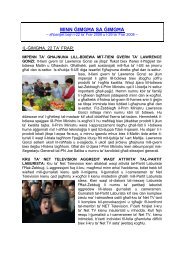Dr & Mrs gonzi - MaltaRightNow.com
Dr & Mrs gonzi - MaltaRightNow.com
Dr & Mrs gonzi - MaltaRightNow.com
You also want an ePaper? Increase the reach of your titles
YUMPU automatically turns print PDFs into web optimized ePapers that Google loves.
| HEALTH |antibioticsContact us with your queries. If you have a medical question email us at: life&style@media.link.<strong>com</strong>.mt or write into: DOC Q & A, Life & Style, Media.Link Communications Co Ltd, Triq Herbert Ganado, Pieta PTA 1450. Pleasestate your age, sex, initials and town. A selection of questions will be answered in the magazine but our doctor cannotenter into personal correspondence.John Cutajar M.D.(doctor of medicine and surgery)The answers to specific problems may not apply to everyone. If you’re worried, see your GP.Almost 80 years ago, a young Scottish researchscientist, Alexander Fleming, made a discoverythat would change the course of history. It was thediscovery, almost by chance, of the first antibiotic:penicillin. This would eventually be hailed as “themiracle drug” that would forever change the treatmentof bacterial infections, which prior to this discovery,were a major cause of death throughout the world.Today, most of us are familiar with the class ofdrugs referred to as antibiotics. We have probablyall been treated at some time or other with a courseof these medications, and undoubtedly most of uscan vouch for their effectiveness through personalexperience. However, there are several aspects ofantibiotic use with which many may not be familiar.Believe it or not, this lack of awareness is probablythe cause of one of the greatest health hazards ofcontemporary medicine.The term antibiotic refers to a drug or medicationthat works by killing or limiting the growth of bacteria.These are small microscopic organisms that canoccasionally invade and grow within the human bodyto cause infection. It thus follows that antibioticsshould only be used when indicated for treatment (andsometimes prevention) of bacterial infections.However, not all infections are caused by bacteria.Other micro-organisms such as viruses and fungi mayalso be responsible. Examples of viral infections includethe <strong>com</strong>mon cold and most sore throats. Such illnesseshave to run their natural course. They will resolve overa period of days, irrespective of whether antibiotics areused or not. In these cases, treatment with antibioticsScientist alexander flemingwill be ineffective, if not harmful! Here, treatment shouldbe symptomatic. This means that other medications canbe used as needed to help control symptoms (e.g. painkillersto relieve pain) and make the person feel betteruntil the illness resolves. Someone may falsely attributecure to antibiotics if these are used, when in reality theywould have had no influence whatsoever on the out<strong>com</strong>e.Unfortunately, this has fuelled demand for inappropriateuse of these drugs.Inappropriate antibiotic use over the years hasled to the development of antibiotic resistance,a phenomenon described by the World HealthOrganisation as “one of the major health caredisasters of the 20 th century.” When an antibiotic isused it will kill those bacteria that are susceptible toits effects, leaving behind those that are resistant toit. These survivors will produce others of their kindthat are similarly resistant to, and thus cannot bekilled by, that particular antibiotic. This is more likelyto occur when an antibiotic is used in an insufficientdose, or for too short a period. Such drug resistanceis rapidly be<strong>com</strong>ing a serious public health concern.For instance, most infections acquired in hospitalsare caused by bacteria that are resistant to at leastone of the antibiotics most <strong>com</strong>monly used to treatthem. In some cases these infections may even be<strong>com</strong>elife-threatening. Inappropriate antibiotic use will leadto the development of more and more of these resistantstrains. Ultimately, an effective and useful antibioticmay eventually be rendered useless.Another important concept is that not all antibioticswork on all types of bacteria. Some are called broadspectrumantibiotics, and are thus effective on avery wide variety of bacteria. Others have a narrowerspectrum, and their effectiveness is more specificto a particular type. Additionally, different types ofantibiotics differ in their ability to reach differentparts of the body. When choosing to treat an infectionwith an antibiotic, a doctor should choose one thatcan reach the site of infection adequately, and thatis most likely to be effective against the particularbacteria responsible for causing that infection. So itis not simply a case of deciding on whether to use anantibiotic or not. Serious thought should also be givento the type, dosage and duration of treatment. Thesedecisions should only be taken by trained medicalprofessionals, and that is why antibiotics shouldn’tbe sold by a pharmacist over-the-counter, but only onpresentation of a valid medical prescription.Like all other drugs, antibiotics can have unwantedside effects. These range from the mild and trivialto the seriously unpleasant and severe. It is oftenacceptable to take the risk of experiencing some ofthese effects when in a particular case, antibiotictreatment will be of obvious benefit. However, it wouldbe foolish to take such risks in situations whereantibiotic treatment is not necessary. Runny noses,fevers and sore throats are more often than not dueto simple viral infections. So we should not expect ourdoctors to prescribe antibiotics for just about anythingwe <strong>com</strong>plain of. Refraining from doing so often reflectsresponsibility and sound clinical judgement, ratherthan what some people regrettably interpret as medicalin<strong>com</strong>petence. Although you may not realise it, yourdoctor may be doing you a favour, preventing you fromspending money on, and risking the side effects of atreatment you do not need.It is clear that antibiotics, when used well, canbe a valuable tool in <strong>com</strong>bating disease. Conversely,inappropriate and excessive use has the potential ofcausing an endless list of undesirable and hazardouseffects. Unless we want to go back to the pre-penicillinera, when simple bacterial infections were a major killerin the world, both health care professionals and patientsshould act more responsibly when antibiotics are to beused. Doctors should prescribe them only when indicated,pharmacists should refrain from selling them over-thecounterand patients should closely follow medical adviceand take their full course of medication as instructed.These measures can help curb the development ofresistance, and allow us all to keep on benefiting from SirFleming’s discovery for many years to <strong>com</strong>e. L&s | DECEMBER ’07 33







![Sandro Chetcuti akku]at b'attentat ta' qtil - MaltaRightNow.com](https://img.yumpu.com/50098970/1/174x260/sandro-chetcuti-akkuat-battentat-ta-qtil-maltarightnowcom.jpg?quality=85)








![Malta tibqa' ]]omm mal-po]izzjoni li ddikjarat fis-summit](https://img.yumpu.com/44301444/1/174x260/malta-tibqa-omm-mal-poizzjoni-li-ddikjarat-fis-summit.jpg?quality=85)